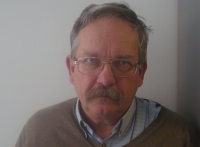I‘m a historian who could call himself a Czech-Ukrainian
Stáhnout obrázek
Bohdan Zilynskyj was born in Prague on 30 November 1954 into a Czech-Ukrainian family and has been an active member of the Ukrainian community all his life. He studied Archival and Auxiliary Historical Sciences at the Faculty of Arts of Charles University in Prague in 1974-1979. He took part in disseminating the text of Charter 77 in 1977. In 1979-1991 he worked as an archivist at the Prague City Archives. Following the Velvet Revolution of 1989, he was active in the Civic Forum of Ukrainians and the Association of Ukrainians and Supporters of Ukraine in the Czech Republic. In 1991-1996 he worked at the Institute of History of Central and Eastern Europe of the Czech Academy of Sciences, and from 1996 at the History and History Didactics Department of the Faculty of Education, Charles University and at the Faculty of Social Sciences of Charles University, where he is still working today. Bohdan Zilynskyj was living in Prague in 2024.
